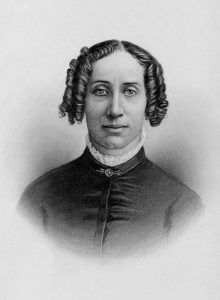
Clarina Nichols
*Clarina Nichols was born on this date in 1810. She was a white-American journalist, lobbyist, and public speaker involved in temperance, abolition, and the women's movement.
Born in West Townshend, Vermont, into a prosperous New England family, Clarina Irene Howard fell on hard times after a disastrous early marriage. Supporting herself and her children on "women's wages" one-half to one-third what men received for similar work, she began writing for a newspaper in Brattleboro, Vermont, the Windham County Democrat. She married the editor and publisher, George Nichols; when he became an invalid, she quietly took over his duties at the paper.
Through her new profession, she was introduced to various reform movements of the day, such as temperance, women's rights, anti-slavery, dress and diet reform, and she embraced many of them. She helped organize the fledgling women's movement in the East. In October 1852, she helped organize the first of several petitions submitted to the Vermont legislature to give women the right to vote in school meetings. When the Kansas-Nebraska Act of 1854 threatened to establish slavery outside of the South, Nichols uprooted her family to become a pioneer and abolitionist in Quindaro, Kansas.
Her efforts helped catapult her adopted state into the forefront of women's rights and racial justice, gaining the respect and support of Susan B. Anthony and Elizabeth Cady Stanton. During her mid-western life, Nichols was a teacher, lecturer, editor, writer, farmer, lay doctor, lawyer, and government clerk. She was a matron in a home for destitute Black children and widows and a conductor on the Underground Railroad while living in Quindaro.
She left a letter about when a Freedom Seeker named Caroline was brought to her house. Freedom Seeker, Caroline's slave master, and other slave hunters were camped on the edge of town looking for her. She tells of hiding Caroline in an empty cistern overnight and then sending her on the road North as soon as it was safe.
Clarina Irene Howard Nichols, prominent enough in her time to merit her chapter in Anthony's History of Woman Suffrage, died on January 11, 1885, in California, where she pioneered and agitated to the end. Nichols has been overlooked since 1900, and only recently have her contributions to equal rights been reassessed.